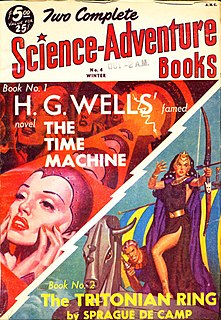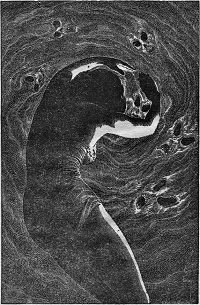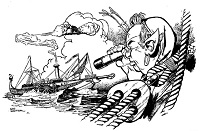Related Research Articles

Lyon Sprague de Camp was an American writer of science fiction, fantasy and non-fiction. In a career spanning 60 years, he wrote over 100 books, including novels and works of non-fiction, including biographies of other fantasy authors. He was a major figure in science fiction in the 1930s and 1940s.

Mu is a mystical lost continent introduced by Augustus Le Plongeon, who used the "Land of Mu" as an alternative name for Atlantis. It was subsequently popularized as an alternative term for the hypothetical land of Lemuria by James Churchward, who asserted that Mu was located in the Pacific Ocean before its destruction. The place of Mu in literature has been discussed in detail in Lost Continents (1954) by L. Sprague de Camp.

The Hyborian Age is a fictional period of Earth's history within the artificial mythology created by Robert E. Howard, serving as the setting for the sword and sorcery tales of Conan the Barbarian.

Lost Continents: The Atlantis Theme in History, Science, and Literature is a study by L. Sprague de Camp that provides a detailed examination of theories and speculations on Atlantis and other lost lands, including the scientific arguments against their existence. It is one of his most popular works. It was written in 1948, and first published serially in the magazine Other Worlds Science Fiction in 1952-1953; portions also appeared as articles in Astounding Science Fiction, Galaxy Science Fiction, Natural History Magazine, and the Toronto Star. It was first published in book form by Gnome Press in 1954; an updated edition was published by Dover Publications in 1970. De Camp revised the work both for its first book publication and for the updated edition.
"Perpetual Motion" is a science fiction short story by American writer L. Sprague de Camp, part of his Viagens Interplanetarias series. It was first published under the title "Wide-Open Planet" in the magazine Future Combined with Science Fiction Stories in the issue for September–October, 1950. It first appeared in book form under the present title in the collection The Continent Makers and Other Tales of the Viagens, published in hardcover by Twayne Publishers in 1953, and in paperback by Signet Books in 1971. It was also included in the paperback edition of The Queen of Zamba published by Dale Books in 1977. This edition was reprinted by Ace Books in 1982 as part of the standard edition of the Krishna novels. A trade paperback edition in which the story was paired with Richard Wilson's "And Then The Town Took Off" was issued by Armchair Fiction in May, 2013 as Wide-Open Planet & And Then The Town Took Off. The story has been translated into Portuguese, Dutch, and Italian.

The Tritonian Ring and Other Pusadian Tales is a 1953 collection of stories by American science fiction and fantasy author L. Sprague de Camp, first published in hardcover by Twayne Publishers. An E-book edition was published as The Tritonian Ring and Other Pasudian [sic] Tales by Gollancz's SF Gateway imprint on September 29, 2011 as part of a general release of de Camp's works in electronic form. The pieces were originally published between 1951 and 1953 in the magazines and anthologies Two Complete Science Adventure Books, Fantasy Fiction, Imagination Stories of Science and Fantasy, and Fantastic Adventures. The title story, the novel The Tritonian Ring has also been published separately.

The Pusadian series is a sequence of fantasy stories by L. Sprague de Camp, begun in the early 1950s and written under the influence of Robert E. Howard's Conan stories. The series, also known as the Poseidonis series, prefigured the numerous sword & sorcery settings of the 1960s and 1970s.

The Tritonian Ring is a heroic fantasy novel written by L. Sprague de Camp as part of his Pusadian series. It was first published in the magazine Two Complete Science Adventure Books for Winter, 1951, and first appeared in book form in de Camp's collection The Tritonian Ring and Other Pusadian Tales. Its first publication as a stand-alone novel was as a paperback by Paperback Library in 1968; the first hardcover edition was from Owlswick Press in 1977. An E-book edition was published as The Tritonian Ring and Other Pasudian [sic] Tales by Gollancz's SF Gateway imprint on September 29, 2011 as part of a general release of de Camp's works in electronic form.

"The Owl and the Ape" is a fantasy story by American writer L. Sprague de Camp, part of his Pusadian series. It was first published in the magazine Imagination: Stories of Science and Fantasy for November, 1951, and first appeared in book form in the de Camp's collection The Tritonian Ring and Other Pusadian Tales. The story has also appeared in the anthology Kingdoms of Sorcery (1976). and the de Camp omnibus collection Lest Darkness Fall/Rogue Queen/The Tritonian Ring and Other Pusadian Tales (2014). It has also been translated into German.

"The Eye of Tandyla" is a fantasy story by American writer L. Sprague de Camp, part of his Pusadian series. It was first published in the magazine Fantastic Adventures for May, 1951, and first appeared in book form in de Camp's collection The Tritonian Ring and Other Pusadian Tales. The story has also appeared in the magazine Fantastic for November 1965, the anthologies Time Untamed (1967), The Magic of Atlantis (1970), Wizards (1983), and The Mammoth Book of Seriously Comic Fantasy (1999), and the de Camp omnibus collection Lest Darkness Fall/Rogue Queen/The Tritonian Ring and Other Pusadian Tales (2014). It has also been translated into French, Spanish, Italian, German and Russian.

"The Hungry Hercynian" is a fantasy short story by American writer L. Sprague de Camp, part of his Pusadian series. It was first published in the magazine Universe Science Fiction for December, 1953, and first appeared in book form in the anthology The Spell of Seven, edited by de Camp. It has also been translated into German, and was first brought together with other works of de Camp in the German collection Die Chronik von Poseidonis.

"Ka the Appalling" is a fantasy story by American writer L. Sprague de Camp, part of his Pusadian series. It was first published in the magazine Fantastic Universe for August, 1958, and first appeared in book form in the anthology The Young Magicians, edited by Lin Carter. It was first brought together with other works of de Camp in his collection The Reluctant Shaman and Other Fantastic Tales. It has also been translated into French, German, and Italian.
"The Rug and the Bull" is a fantasy short story by American writer L. Sprague de Camp, part of his Pusadian series. It was first published in the anthology Flashing Swords! #2, edited by Lin Carter. It has also been translated into Italian, German and Dutch.

"The Stronger Spell" is a fantasy short story by American writer L. Sprague de Camp, part of his Pusadian series. It was first published in the magazine Fantasy Fiction for November 1953, and first appeared in book form in de Camp's collection The Tritonian Ring and Other Pusadian Tales. It has since been reprinted in the anthology The Mighty Barbarians, edited by Hans Stefan Santesson. It was included in the omnibus de Camp collection Lest Darkness Fall/Rogue Queen/The Tritonian Ring and Other Pusadian Tales published in trade paperback by Gollancz in February 2014 and as an ebook by Gateway/Orion in March of the same year. It has also been translated into Dutch and German.

The Viagens Interplanetarias series is a sequence of science fiction stories by L. Sprague de Camp, begun in the late 1940s and written under the influence of contemporary space opera and sword and planet stories, particularly Edgar Rice Burroughs's Martian novels. Set in the future in the 21st and 22nd centuries, the series is named for the quasi-public Terran agency portrayed as monopolizing interstellar travel, the Brazilian-dominated Viagens Interplanetarias. It is also known as the Krishna series, as the majority of the stories belong to a sequence set on a fictional planet of that name. While de Camp started out as a science fiction writer and his early reputation was based on his short stories in the genre, the Viagens tales represent his only extended science fiction series.
Bibliography of science fiction, fantasy, historical fiction and nonfiction writer L. Sprague de Camp:

"The Animal-Cracker Plot" is a science fiction short story by American writer L. Sprague de Camp, a story in his Viagens Interplanetarias series. It is the second (chronologically) set on the planet Vishnu, and the first to feature the interstellar con-man Darius Koshay. It was first published in the magazine Astounding Science-Fiction in the issue for July, 1949. It first appeared in book form in the collection The Continent Makers and Other Tales of the Viagens, published in hardcover by Twayne Publishers in 1953, and in paperback by Signet Books in 1971. The story has been translated into Portuguese, Dutch, and Italian.

"The Galton Whistle" is a science fiction short story by American writer L. Sprague de Camp, a story in his Viagens Interplanetarias series. It is the first (chronologically) set on the planet Vishnu. It was first published, as "Ultrasonic God," in the magazine Future Combined with Science Fiction Stories in the issue for July, 1951. It first appeared in book form under the present title in the collection The Continent Makers and Other Tales of the Viagens, published in hardcover by Twayne Publishers in 1953, and in paperback by Signet Books in 1971. It also appeared in the anthologies Novelets of Science Fiction, The Good Old Stuff, and The Good Stuff. The story has been translated into Portuguese, Dutch, and Italian.

"Finished" is a science fiction short story by American writer L. Sprague de Camp, part of his Viagens Interplanetarias series. It was first published in the magazine Astounding Science Fiction in the issue for November, 1949. It first appeared in book form in the collection The Continent Makers and Other Tales of the Viagens, published in hardcover by Twayne Publishers in 1953 and in paperback by Signet Books in November, 1971.
References
- 1 2 Laughlin, Charlotte; Daniel J. H. Levack (1983). De Camp: An L. Sprague de Camp Bibliography. San Francisco: Underwood/Miller. p. 245.
- 1 2 The Stone of the Witch Queen title listing at the Internet Speculative Fiction Database